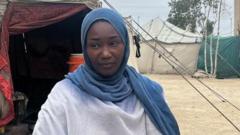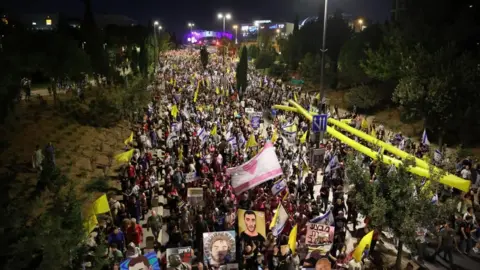The situation in Port Sudan has rapidly deteriorated as a result of a week-long series of aerial assaults, primarily targeting the Red Sea city by the Rapid Support Forces (RSF) paramilitary group. Previously regarded as a safe haven from the ongoing civil war affecting Sudan, many residents now find themselves amid chaos, with significant impacts on daily life and essential services.
Following six days of relentless drone strikes, smoke continues to billow from at least three fuel depots hit during the bombardment. Emergency responders are struggling to extinguish the ensuing fires, as the city reels from the consequences. The ongoing conflict, which began more than two years ago between the RSF and the Sudanese army, has created one of the worst humanitarian crises in the world, resulting in over 12 million displaced individuals.
Among those affected is 26-year-old Mutasim, who sought refuge in Port Sudan from Omdurman due to threats from the RSF. He lamented the skyrocketing cost of water, which increased from 2,000 Sudanese pounds (approximately $3.30) a week ago to an average of 10,000 pounds ($16.50) today—leaving him with limited access for his family of eight. With fuel shortages adding to the strain, he noted that procuring gasoline has led to hours of waiting in line.
Although markets in Port Sudan remain open, the city faces severe disruptions, with residents experiencing significant blackouts for the past two weeks exacerbated by this week's attacks. Mutasim's elderly aunt suffers from the heat without electric fans, highlighting the urgent need for power in the tropical climate.
Hawa Mustafa, a mother and teacher displaced from el-Geneina in Darfur, echoed the sentiments of fear and insecurity plaguing the region. Living in a shelter for displaced individuals, she described a return to chaotic conditions, with sounds of drones echoing her traumatic memories of the initial stages of the war. She voiced despair over potentially needing to flee again, expressing concerns about the lack of safe options and the possibility of disappointments in seeking refuge abroad.
Mariam Atta, another resident, remarked on how drastically life had changed in Port Sudan, citing constant fear among the population. Aid organizations have maintained Port Sudan as a critical humanitarian hub, leveraging its port and airport for essential supply deliveries. The World Food Programme has distributed food to thousands at risk of famine, but the recent violence jeopardizes these operations.
Shashwat Saraf, director of the Norwegian Refugee Council in Sudan, underscored the potential for severe disruptions to vital aid channels if attacks persist, jeopardizing food and medical supplies while further worsening the humanitarian crisis. Previously a vibrant locale, Port Sudan now finds itself shrouded in darkness, with residents remaining indoors and the atmosphere marked by heightened uncertainty and anxiety.

















